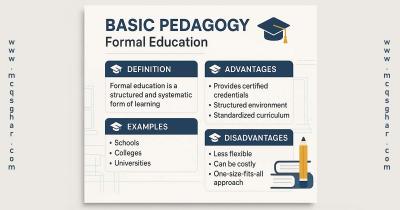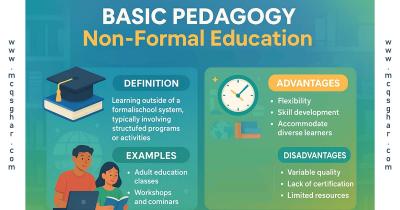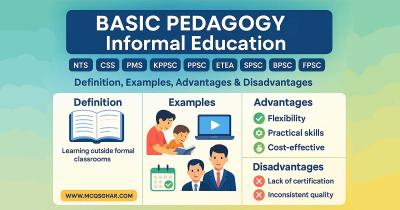بِسْمِ اللَّهِ الرَّحْمَنِ الرَّحِيم
BASIC PEDAGOGY: Understanding Intelligence, IQ, and Education: Definitions, Tests, and Types
BASIC PEDAGOGY
What is intelligence?
Human intelligence is a mental quality that consists of the abilities to learn from experience, adapt to new situations, understand and handle abstract concepts, and use knowledge to manipulate one's environment.
What Does IQ Stand For?
IQ stands for intelligence quotient. It is a value that can be calculated with the formula:
IQ=(mental age/actual age)×100
What is IQ?
IQ is a measure of an individual's reasoning ability. In short, it is supposed to assess how well someone can utilize information and logic to answer questions or make predictions.
"What does an IQ test measure?" you ask?
Intelligence quotient tests help evaluate IQ by measuring short- and long-term memory. They also measure how efficiently and quickly people can solve puzzles and recall information they've heard.
How to Test IQ?
Example:
What will be the IQ of a 25-year-old boy whose mental age is 16?
IQ=(Mental Age/Chronological Age)×100
IQ=(16/25)×100
IQ=64
IQ Score Table
The measure of an IQ test scale may vary depending on the test. Below is a table of the IQ test score classification of the Stanford-Binet Intelligence Scale:
| IQ Score | Correspondence |
| 145 – 160 | Very gifted or highly advanced |
| 130 – 144 | Gifted or very advanced |
| 120 – 129 | Superior |
| 110 – 119 | High average |
| 90 – 109 | Average |
| 80 – 89 | Low average |
| 70 – 79 | Borderline impaired or delayed |
| 55 – 69 | Mildly impaired or delayed |
| 40 – 54 | Moderately impaired or delayed |
Education
The root of Word education is derived from Latin words Educare, Educere, and Education. Word educate means to nourish, to bring up. The word educere means to lead froth, to draw out. The Latin “educatum”, which itself is composed of two terms, “E” and “Duco”. “E” implies a movement from inward to out word and “duco” means developing or progressing.
Now we comes the definition of education.
“Positive change in behavior or mind of individual, society or community life according to the need and demand of society” is called education.
Education and Learning
- Learning is the process and education is the product.
- Education is the process of imparting knowledge, values, skills and attitudes, which can be beneficial to an individual. On the contrary, learning is the process of adopting knowledge, values and skills.
- Learning is the basic instinct possessed by all individuals. On the other hand, education is acquired by individuals.
- Learning is said to be an ongoing process. Education is something that one gets at some point in their life.
- Learning is an informal process, and education is a formal process.
- Learning is knowledge gained through experience, and education is knowledge gained through teaching.
Modes/Types of Education
Education goes beyond what takes places within the four walls of the classroom. A child gets the education from his experiences outside the school as well as from those within on the basis of these factors.
There are three main types of education, namely, Formal, Informal and Non-formal. Each of these types is discussed below.




